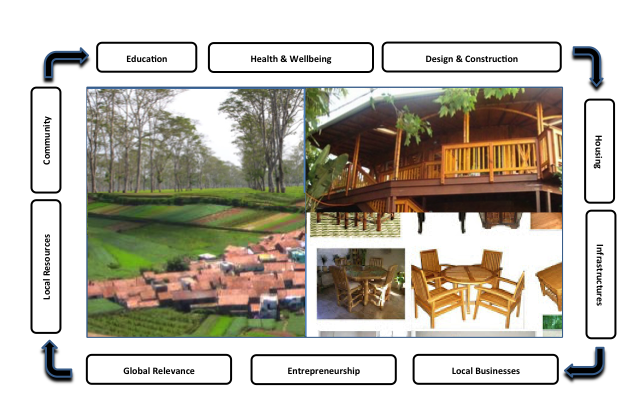Smart Villages
Construction of affordable housing and related infrastructure for ‘Smart Villages’ Communities in Assam, India

Development of smart villages framework based on a bottom up data-driven approach by keeping the community at the core for policy formulation and decision making.
The Melbourne School of Design currently has an exciting opportunity for two Doctor of Philosophy (PhD) candidates to join an innovative multidisciplinary project working towards supporting Smart Villages research through capacity building in construction management practices for the State of Assam, India. The project, funded by the State Government of Assam, India to research construction of affordable housing and related infrastructure for rural communities in Assam supports a partnership between the University of Melbourne, Assam Engineering College Guwahati, Indian Institute of Technology Guwahati, and numerous government and private agencies in Assam, to explore innovative solutions on Smart Villages initiatives and potential contributions to policy support, leadership and capacity building across the state.
The two successful PhD candidates will join a dynamic project team involving Dr Hemanta Doloi, Prof Mark Burry, Dr Robert Crawford and other experts from the University of Melbourne, three experts from Assam Engineering College, Guwahati and IIT Guwahati and eight academic scholars from Assam, India. Working in close collaboration between the three institutions, the project team will investigate the potential for, and the implications of localised skills and knowledge, materials, technology and processes for designing and procuring affordable houses in order to address the growing challenges of housing needs in village communities in Assam, India. The study will also examine the cross-cultural linkages between the Australian and Assamese Construction Industries and develop strategies for building capacity, improving construction practices and fostering growth in relation to the Assamese Smart Village program.
Applicants are asked to write a short (1000 word) research proposal responding to a theme of interest relating to the project.
Some suggested themes are:
- Affordable Housing with localised materials and resources
- Prefabrication and off-site construction
- Use of rural information systems for location specific planning and priority setting in projects
- Business models and governance supporting construction of affordable housing and infrastructure
Applicants are encouraged to also come up with their own project proposals reflecting on this brief.
These scholarships are valued at $A26,288 per annum for 3 years, with one possible 6 month extension and are open to both international students and Australian citizens or permanent residents. Each candidate will also be supported with appropriate operating allowance to support fieldwork, conference travel, and development. Applicants should have graduated with an Honours or Master’s degree in a discipline relevant to the project aims and must meet the minimum entry requirements for the Doctor of Philosophy in the Melbourne School of Design.
Project details
Further reading
Cross-cultural analysis and capacity building in construction management